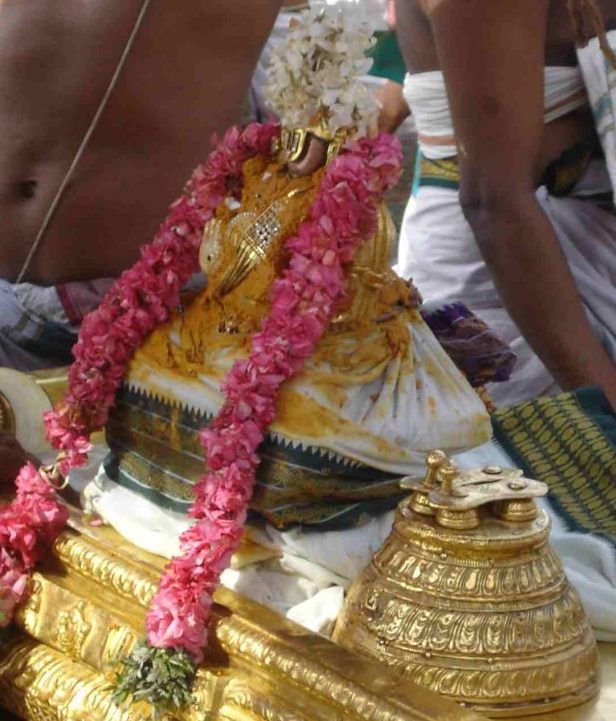InROL irukka maNai nIrATTi – (nammAzhvAr, tiruvAsiriyam – 6)
ஈன்றோ ளிருக்க மணைநீ ராட்டி – நம்மாழ்வார் திருவாசிரியம்
InROL = (When) the mother who gave birth
irukka = is there
niirATTi = (why perform) shower (and rituals)
maNai = (for a) wooden plank ?
nammAzhvAr, fifth in the AzhvAr (shrIviaShNava saints) dynasty, has composed four hymns (prabandham- s). In the first one, AzhvAr was praising Lord ViShnu from his deep, devotional state (parabhakti) and was praying for the liberation (mokSham) from the bondage (samsAra). The Lord’s intention was to keep the AzhvAr on earth for some more time to perform good deeds for the world through him.
The Lord showed him internally of His innate nature (svarUpa), form (rUpa), qualities (guNa) and His wealth (vibhUti). AzhvAr, in ecstatic wise mood (paraj~nAna), sings this poem (prabhandam). This is written more like a prose and reads very easily; it is considered to be equivalent to yajur veda and is impregnated with the rich meanings of the word “nArAyaNa”.
This verse says, “why recite prayers to a wooden plank, when one’s own mother, who gave birth to him, is available?” AzhvAr depicts the olden day custom of substituting a wooden blank when the real thing is not available. Note that the real mother who gave birth is mentioned specifically because the one who had painstakingly carried for ten moths with all the sacrifices has more bondage to the child than anyone else.
Exploring the inner meaning, (svApadesham), the comparison of mother here is the simile used for Lord shrIman nArAyaNa. He is the root cause (Adi) for everything. He is the one who created everything and delegated the responsibility to others and at the dissolution of the universe, he carries all the sentient (cetana) and non sentient (acetana) in his stomach. When one realizes this, why would one go and pray to other demi-gods? That is similar to rushing out and signing up for volunteering social service while ignoring one’s own elderly mother who desperately needs help.
As usual, the AzhvAr demonstrates the mastery of compressing the essence of scripts (shruti, smR^iti etc.) in a couple of tamizh words. upaniShads (the prime part of veda- s) say “mAtru devo bhava”. It means “Regard your mother as God”. Then only It mentions the father, teacher, and guest. A tamizh proverb says mother and father are the direct Gods in front you .
The moral here is – mother is used as a metaphor for Lord shrIman nArAyaNa, the true mother and protector for all.
1. Goforthereal.
Ignore the fake, pseudo, or substitute. All that glitters is not gold.
2.Truth may easier than you imagine.
Just like mother, it is ignored without realizing the greatness or happiness it can bring.
3. Don’t be myopic, but look for permanence.
Truth is the only one that is permanent. An example of this permanence is the mother’s sacrifice, which proves her love and care, which is time-tested and always pure. Compare sugar and aspartame. The negative effect of sugar is small and well- publicized, but do you know the long term effects of aspartame or other substitutes?
Why throw away the diamond in the hand And dig for the pebbles in the beach sand?
puviyum iru visumbum ninnakatta * nI en
seviyin vazhi pugundu en uLLAi – avivu inRi
yAn periyan nI periyai enbadanai yAr aRivAr?
Unparugu nEmiyAi! uLLu
(nammAzhvAr, periya tiruvantAdi – 75)
Published from “Three Minutes” series written by A.S.Rajagopalan Swami of Ohio.








